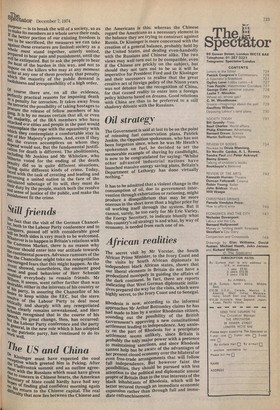The case for hanging them
The organs of public opinion, like the elected and other representatives thereof, have been in a state of some confusion, honest and dishonest alike, over the crucial matter of the wisdom or not of introducing the death penalty as a punishment for terrorism. The Sunday Tunes, having some time ago advanced towards the possible desirability of such an action is now in full retreat, its skirts around its knees. But its sister paper, the Times, has gone almost so far as to endorse the cause of those who would desire to punish death with death. This paper has for long advocated execution as the only fit penalty for those guilty of certain peculiarly modern and peculiarly barbaric crimes. The time has come, with many in the House of Commons demanding the action, and with the majority of the public crying out for it, to resume the argument.
Many of those who argued and voted for the abolition of the death penalty — long before terrorism, it must be said, was a widely known phenomenon — justified their stand by the argument that it was always wrong to take life and that, besides, the penalty of death was neither a just riposte to the kind of murder then known nor an adequate deterrent for the future. By and large the argument that death is a just retribution for death — argued extremely well in the columns of the Sunday Telegraph this week by a former editor of The Spectator, Mr Nigel Lawson — has gone by the board. Yet, even if it is accepted that the penalty of death is, for moral or practical reasons, the wrong penalty for a private murder — that is, one within the family, or of the kind of most murders in this country — or even for a murder carried out in the course of a criminal act for gain, an entirely different matter is presented by a series of murders which, by definition, are acts against the whole society. The terrorist murder is a new kind of murder.
The acts of the IRA in Birmingham, or .Guildford, or Aldershot, or in the various other places where these cowardly criminals have found their innocent victims, where this grisly crew or, for that matter, the other grisly crew, the Arab killers — have perpetrated their evil, are acts against whole societies. Their purpose is not to kill one man or woman out of indidivual hate, or for individual gain. Their purpose — their carefully thought out, carefully willed Purpose — is to break the will of a society, so as t?niake its members as a whole serve their ends. u the better portion of our existing freedom is not to be sacrificed, the measures we can take against these creatures are limited: society as a Whole must stand together, utterly united, Prepared to bear pain and punishment, until the be extirpated. But to ask the people to bear the he at of the burden in this way, and not to pose on the killers who may at any moment ,LfiYe at any one of them precisely that penalty 7ulch the majority of the public demand is '00lishness and irresponsibility of a high order.
°f course there are, on all the evidence, trfectly practical reasons for imposing death a Penalty for terrorism. It takes away from the terrorist the possibility of taking hostages to Procure the release of fellow members of his "flg• It is by no means certain that all, ox even die • majority, of the IRA members who have :144eked ceir cities and people in the past would 'untemplate the rope with the equanimity with Which they contemplate a comfortable stay in one °tfHer Majesty's prisons. And, even if they h e craven accomplices on whom they cee, od would not. But the fundamental justifi rn for death is different. The abolitionists, hitel;t1cIfog Mr Jenkins and Mr Whitelaw, who pe"terto voted for the ending of the death fann;altY did so in quite different situations, fas4og quite different kinds of crime. Today, geced with the task of creating and leading and p.,■veroing a united nation in the face of the t ieulated sabotage of its will, they must do anoeir duty by the people, match both the resolve t„,d,sense of justice of the public, and make the "fushment fit the crime.
Still friends rhe rhe
Lor act that the visit of the German Chancelch, both to the Labour Party conference and to tvileg, tiers, passed off with considerable good ty,T2 on both sides is very much to be welcomed. til:atever is to happen in Britain's relations with NA Common Market, there is no reason why the°shb0tild enter into our attitude towards "continental powers. Advance rumours of the "ene the Chancellor might take on renegotiation eve°11raged fears that this might happen. As the „. ellt showed, nonetheless, the eminent good „ e and good behaviour of Herr Schmidt 131ed everybody to remain friends. Mr desi".8°n, it seems, went rather farther than was of hir.able, either in the interests of his country or Party, in assuring the Chancellor of his to keep within the EEC, but the stern • 01,, critir,:e„ of the Labour Party to deal most HY and sharply with any renegotiated Sec'. clearly remains unweakened, and Herr nudt recognised that in the course of his hut • No great change, then, has occurred: Ol „toe Labour Party conference and the party as serm, in the new role which it has adopted WorwellPatriotic party, has continued to do its he US and China teentis solger must have expected the cool the-Pflon which greeted him in Peking. After ke Vladivostok summit and an outline agree With the Russians which must have given se: to concern in Chinese hearts, the American hor,retarY of State could hardly have had any • of finding glad confident morning again difius return to the Chinese capital. The real leultY that now lies between the Chinese and the Americans is this: whereas the Chinese regard the Americans as a necessary element in the balance they are trying to construct against Russia, Dr Kissinger is more concerned with the creation of a general balance, probably held by the United States, and dealing even-handedly with the Russians and Chinese alike. The two views may well turn out to be compatible, even if the Chinese are prickly on the subject, but should they not turn out to be so it will be imperative for President Ford and Dr Kissinger and their successors to realise that the great creative act of foreign policy of the Nixon years was not detente but the recognition of China, for that caused reality to enter into a foreign policy hitherto based on dreams. Good relations with China are thus to be preferred to a still shadowy detente with the Russians.
Oil strategy
The Government is said at last to be on the point of releasing fuel conservation plans. Patrick Jenkin, the Opposition spokesman, who has not been forgotten since, when he was Mr Heath's spokesman on fuel, he decided to set the memorable example of shaving by candlelight, is now to be congratulated for saying: "Whilst other advanced industrial nations have launched massive energy saving plans, Britain's Department of Lethargy has done virtually nothing."
It has to be admitted that a violent change in the consumption of oil, due to government intervention through exhortation or rationing, might produce a disequilibrium that may be more onerous in the short term than a higher price for oil working itself through the system. But it cannot, surely, be too early for Mr Eric Varley, the Energy Secretary, to indicate bluntly what this country's oil strategy is and what, by way of economy, is needed from each one of us.
African realities
The secret visit by Mr Vorster, the South African Prime Minister, to the Ivory Coast and the visits by South African diplomats to independent black African states, shows that our liberal elements in Britain do not have a predestined monopoly in guiding the affairs of the dark continent. In fact, there are reports indicating that West German diplomatic initiatives prepared the way for the visits, which were highly secret, to the Ivory Coast and to Senegal.
Rhodesia is now, according to the informal approaches Mr Arthur Bottomley claims he has had made to him by a senior Rhodesian citizen, sounding out the possibility of the British Government's approving a new constitutional settlement leading to independence. Any anxiety on the part of Rhodesia for a precipitate settlement seems unlikely, since Britain is probably the only major power with a pretence to maintaining sanctions, and since Rhodesia cannot help but be aware of the advantages of her present closed economy over the bilateral or even free-trade arrangements that will follow full . independence. But however faint the possibilities, they should be pursued with less attention to the political and diplomatic amour propreof Britain than to the true interests of the inhabitants nhabitants of Rhodesia, which will be better se cured through an immediate economic expansion rather than through full and immediate enfranchisement.



































 Previous page
Previous page